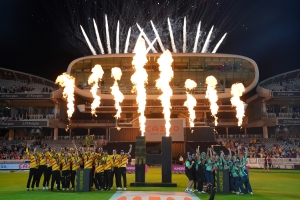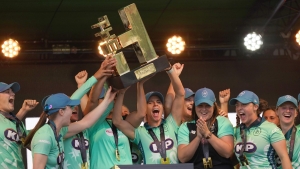Chief executive Tim Bostock says Durham being given a tier one women’s team is the “most visible way” the England and Wales Cricket Board has put past issues with the county to bed.
Durham were stripped of Test status and demoted to Division Two of the County Championship in October 2016 as part of a raft of unprecedented sanctions for accepting a £3.8million bailout from the ECB.
While Durham are back in Division One this season, captain Scott Borthwick said last year there remains some bitterness towards the ECB from a lot of people at the club at how the situation was handled.
But Bostock thinks relations, at least at hierarchical level, thawed some time ago and he argued Durham being awarded one of the eight professionalised women’s teams last week is a telling indicator of that.
“I was always focused on fixing what was in front of me and rebuilding relationships everywhere but particularly with the ECB,” Bostock, who joined Durham in July 2018, told the PA news agency.
“No matter what, if you’re going to war with your governing body, who are your main funders and your main decision-makers, you’re not going to get anywhere and that’s the same in any walk of life.
“Our focus was on rebuilding our reputation and by doing that we got a place at the top table again, which meant we were in a position to influence in a positive way future decisions.
“During the last period, the ECB has been very supportive of Durham. This isn’t the first time they’ve demonstrated it but this is the most visible way the ECB has demonstrated that the past is behind us.”
The current women’s regional structure is being replaced next year as teams have been aligned with Durham, Essex, Hampshire, Lancashire, Nottinghamshire, Somerset, Surrey and Warwickshire.
Bostock believes one of the biggest selling points in Durham’s pitch as they edged out rival bids from the likes of Yorkshire was that all their home games would be played at the Seat Unique Riverside.
“The stability of the club is one thing and our vision for the future,” Bostock said. “Reputation-wise, we took a bit of a hit a few years ago but we’ve managed to rebuild that.
“All of our games will be played at the main ground, an international ground and giving the women the stage to demonstrate what they can do and not have to play on outgrounds.
“There will be the same effort and expertise going into making the women the best they can possibly be as what goes into the men. That is absolutely right.”
The decision seemingly boosts Durham’s prospects of being involved in The Hundred from next year, with the ECB contemplating expanding the tournament from eight to 10 teams and pursuing private investment.
One of the proposals under consideration and said to be favoured by the ECB is giving host counties 51 per cent of equity in their team that they could then sell off to receive a significant windfall.
Indeed, the financial assistance could go a long way to paying off a £27million hotel complex at Durham’s ground, currently in the planning stage, which Bostock estimates will be a “game-changer” for the county, quadrupling profits and doubling turnover.
“There’s no doubt having a professional women’s team helps with aspirations for a team in The Hundred,” Bostock added.
“It’s critical we get a Hundred team here. Financially it’s going to be a massive boon. The difference between The Hundred teams and non-Hundred teams financially is going to be like chalk and cheese.
“The proposed sell-off of the teams is a significant amount of money. It would put the club on a really, really strong financial footing which then goes all the way back into the development of cricket with the men and women, it all mushrooms from there.”




























